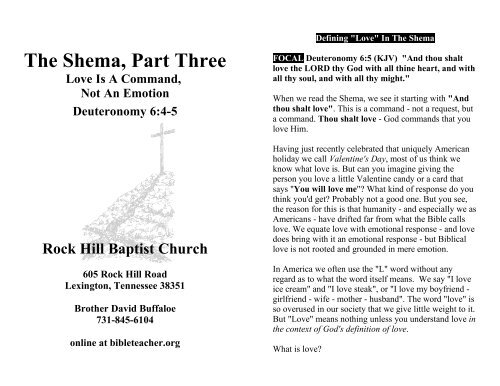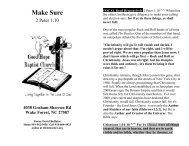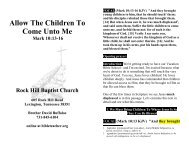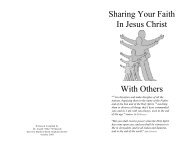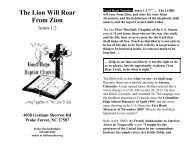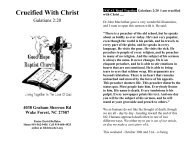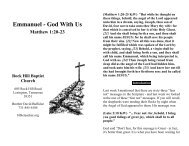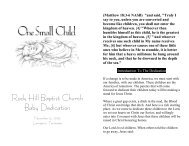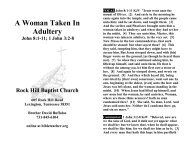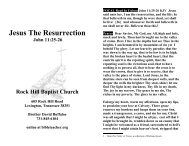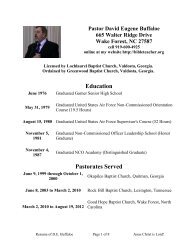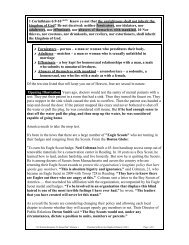The Shema, Part 3 Love Is A Command, Not An ... - Bibleteacher.org
The Shema, Part 3 Love Is A Command, Not An ... - Bibleteacher.org
The Shema, Part 3 Love Is A Command, Not An ... - Bibleteacher.org
You also want an ePaper? Increase the reach of your titles
YUMPU automatically turns print PDFs into web optimized ePapers that Google loves.
<strong>The</strong> <strong>Shema</strong>, <strong>Part</strong> Three<br />
<strong>Love</strong> <strong>Is</strong> A <strong>Command</strong>,<br />
<strong>Not</strong> <strong>An</strong> Emotion<br />
Deuteronomy 6:4-5<br />
Rock Hill Baptist Church<br />
605 Rock Hill Road<br />
Lexington, Tennessee 38351<br />
Brother David Buffaloe<br />
731-845-6104<br />
online at bibleteacher.<strong>org</strong><br />
Defining "<strong>Love</strong>" In <strong>The</strong> <strong>Shema</strong><br />
FOCAL Deuteronomy 6:5 (KJV) "<strong>An</strong>d thou shalt<br />
love the LORD thy God with all thine heart, and with<br />
all thy soul, and with all thy might."<br />
When we read the <strong>Shema</strong>, we see it starting with "<strong>An</strong>d<br />
thou shalt love". This is a command - not a request, but<br />
a command. Thou shalt love - God commands that you<br />
love Him.<br />
Having just recently celebrated that uniquely American<br />
holiday we call Valentine's Day, most of us think we<br />
know what love is. But can you imagine giving the<br />
person you love a little Valentine candy or a card that<br />
says "You will love me"? What kind of response do you<br />
think you'd get? Probably not a good one. But you see,<br />
the reason for this is that humanity - and especially we as<br />
Americans - have drifted far from what the Bible calls<br />
love. We equate love with emotional response - and love<br />
does bring with it an emotional response - but Biblical<br />
love is not rooted and grounded in mere emotion.<br />
In America we often use the "L" word without any<br />
regard as to what the word itself means. We say "I love<br />
ice cream" and "I love steak", or "I love my boyfriend -<br />
girlfriend - wife - mother - husband". <strong>The</strong> word "love" is<br />
so overused in our society that we give little weight to it.<br />
But "<strong>Love</strong>" means nothing unless you understand love in<br />
the context of God's definition of love.<br />
What is love?
<strong>The</strong> best definition is given in the Cross of Calvary.<br />
Nearly every child in America can say these words, yet<br />
they are more than mere words:<br />
(John 3:16 KJV) "For God so LOVED the world,<br />
that He gave his only begotten Son, that whosoever<br />
believeth in Him should not perish, but have<br />
everlasting life."<br />
Now here's love, God - styled love. God so loved the<br />
world. Let me ask you these questions, and see if you<br />
understand where my heart is going:<br />
Question: Did the world love God first, or did God love<br />
the world first? (the answer is in 1 John 4:19)<br />
Question: <strong>Is</strong> the world sinless as God is sinless? (the<br />
answer is in Romans 3:10-18)<br />
Question: <strong>Is</strong> the world worthy of God's love? (the<br />
answer is in Romans 1:28-32; Hebrews 11:32-38)<br />
Question: Does the world return God's love? (the<br />
answer is in John 1:10-11)<br />
Question: Does the world love or hate Jesus? (the<br />
answer is in John 15:18-25)<br />
<strong>An</strong>d yet the Bible says God so loved the world. <strong>Love</strong><br />
cannot be mere emotion, but must be something else.<br />
Biblical or Divine <strong>Love</strong> is that quality that seeks to do<br />
the highest good for another. In the context of salvation<br />
we see that God so loved the world does not necessarily<br />
mean that He felt good about the world, nor that He<br />
approved or the world. God neither approves nor feels<br />
good about the world, for the world is lost in its sin. In<br />
fact, prior to salvation the Bible says that we were the<br />
enemies of God:<br />
(Romans 5:10 KJV) "For if, when we were enemies,<br />
we were reconciled to God by the death of his Son,<br />
much more, being reconciled, we shall be saved by his<br />
life."<br />
and yet, even as enemies, God still loved us or did the<br />
highest good toward us regardless as to how it felt.<br />
If we are ever going to make a difference in the world<br />
around us, we must cease to be emotionally driven and<br />
become God driven. We must love like God has told us<br />
to love - not tossed about by feelings, but driven by His<br />
<strong>Command</strong>. We view <strong>Love</strong> in a way that is totally apart<br />
from the Biblical view of <strong>Love</strong>. Humanity's view of love<br />
is that a young man in love is driven by his emotions to<br />
pursue something or someone who will fulfill his<br />
desires 1 . He then goes out looking for love. When his<br />
eyes fall on the love of his or her life then he or she woos<br />
him or her to win that love.<br />
1 By the way, ladies, this applies to you, too!
If she spurns that<br />
love, the man is<br />
devastated -<br />
having a broken<br />
heart. This type of<br />
love - though it is<br />
found in the<br />
Scripture - is not<br />
God's ideal of<br />
love. In the ancient<br />
world marriages<br />
were often arranged<br />
by the father or the<br />
head of the family. One of the most beautiful passages in<br />
all of Scripture is the story of father Abraham finding a<br />
wife for his son <strong>Is</strong>aac (Genesis 24:1-10). Abraham<br />
called the oldest servant of his household and told him to<br />
go out and find a wife for <strong>Is</strong>aac. Abraham had promised<br />
God that his son would not marry any of the unbelieving<br />
Canaanites, and he was too old and sick to go find a wife<br />
for his boy. So he sent his servant out. <strong>The</strong> servant said:<br />
Abraham's response was very simple: Trust God! So the<br />
servant went out and, the Bible says, just as Abraham<br />
believed the LORD God did. By the way, this is YHWH<br />
Elohiym, the name of the Eternal Triune God. <strong>The</strong><br />
servant went out and, coming to the city of Nahor he<br />
prayed:<br />
<strong>The</strong> servant prayed just as his master Abraham prayed,<br />
approaching YHWH Elohiym for blessing. <strong>The</strong> servant<br />
asked God to give him a sign as to who the wife of <strong>Is</strong>aac<br />
should be. <strong>The</strong> woman who came to the well who would<br />
be <strong>Is</strong>aac's wife would say (Genesis 24:14) "... drink,<br />
and I will give thy camels drink also...". <strong>The</strong> servant<br />
stood by the well and waited and, just as he believed,<br />
YHWH Elohiym sent out a woman named Rebekah to<br />
be <strong>Is</strong>aac's wife. Now bear in mind that the only person
who has seen Rebekah so far is the servant, and YHWH<br />
Elohiym, the Eternal God. Laban her father, having<br />
never seen neither <strong>Is</strong>aac nor Abraham said that Rebekah<br />
could go be his wife. Rebekah's brother and mother<br />
wanted her to wait a few days - but Rebekah herself said<br />
"I will go". What drove Rebekah and <strong>Is</strong>aac together, two<br />
people from whom God would bring forth many nations<br />
to bless? It was not emotion, but it was obedience to God<br />
- a love that obeys, not a love that feels. Obedience to<br />
God drove the servant to Rebekah, Rebekah to <strong>Is</strong>aac, and<br />
<strong>Is</strong>aac to Rebekah. Because God drove the love, that love<br />
was rewarded with a rich, full emotional response that<br />
blessed not only <strong>Is</strong>aac and Rebekah - but all of their<br />
descendants.<br />
think He feels good about the sinner? This is what the<br />
humanist thinks, that God feels good about the sinner.<br />
But that's not what the Scripture says. <strong>The</strong> Bible says:<br />
2<br />
(Psalms 5:5 KJV) "<strong>The</strong> foolish shall not stand in thy<br />
sight: thou hatest all workers of iniquity."<br />
What? You HATE all workers of iniquity, dear God? <strong>Is</strong><br />
this just an isolated instance in the Scripture? No, we see<br />
this pattern repeated throughout the Bible.<br />
(Psalms 11:5 KJV) "<strong>The</strong> LORD trieth the righteous:<br />
but the wicked and him that loveth violence his soul<br />
hateth."<br />
Psalms 45:6-7 (KJV) "Thy throne, O God, is for ever<br />
and ever: the scepter of thy kingdom is a right<br />
scepter. {7} Thou lovest righteousness, and hatest<br />
wickedness: therefore God, thy God, hath anointed<br />
thee with the oil of gladness above thy fellows."<br />
<strong>Love</strong> <strong>Is</strong> <strong>Command</strong>ed In <strong>The</strong> <strong>Shema</strong><br />
For A Reason!<br />
<strong>Love</strong> is commanded in the <strong>Shema</strong> because God's<br />
definition of <strong>Love</strong> is not mere emotion. Divine <strong>Love</strong><br />
does the highest good toward it's object regardless as to<br />
whether it feels good or not.<br />
Let me ask you this: How do you think God feels about<br />
sinners? If He loved the world so much that He gave His<br />
only Begotten Son up as a sacrifice for our sin - do you<br />
Revelation 2:6 (KJV) " 3 But this thou hast, that thou<br />
hatest the deeds of the Nicolaitanes, which I also<br />
hate."<br />
<strong>The</strong> LORD 4 hates the one who loves violence! <strong>The</strong><br />
Psalmist uses the most holy and enduring name of God<br />
YHWH when he describes God's emotional disposition<br />
toward the destroyer. We were all in the place, at one<br />
time or the other in our lives, when we were children of<br />
wrath (Ephesians 2:3), upsetting to God. God's attitude<br />
2 powerpoint slide here<br />
3 To the Church of Ephesus<br />
4 YHWH, the Eternal and most holy name of God.
- His emotional disposition toward unbelieving <strong>Is</strong>rael<br />
was harsh to say the least:<br />
(Hosea 9:15 KJV) "All their wickedness is in Gilgal:<br />
for there I hated them: for the wickedness of their<br />
doings I will drive them out of mine house, I will love<br />
them no more: all their princes are revolters."<br />
(Psalms 78:56-68 KJV) "Yet they tempted and<br />
provoked the most high God, and kept not his<br />
testimonies: {57} But turned back, and dealt<br />
unfaithfully like their fathers: they were turned aside<br />
like a deceitful bow. {58} For they provoked him to<br />
anger with their high places, and moved him to<br />
jealousy with their graven images. {59} When God<br />
heard this, he was wroth, and greatly abhorred<br />
<strong>Is</strong>rael: {60} So that he forsook the tabernacle of<br />
Shiloh, the tent which he placed among men; {61}<br />
<strong>An</strong>d delivered his strength into captivity, and his<br />
glory into the enemy's hand. {62} He gave his people<br />
over also unto the sword; and was wroth with his<br />
inheritance. {63} <strong>The</strong> fire consumed their young men;<br />
and their maidens were not given to marriage. {64}<br />
<strong>The</strong>ir priests fell by the sword; and their widows<br />
made no lamentation. {65} <strong>The</strong>n the Lord awaked as<br />
one out of sleep, and like a mighty man that shouteth<br />
by reason of wine. {66} <strong>An</strong>d he smote his enemies in<br />
the hinder parts: he put them to a perpetual<br />
reproach. {67} Moreover he refused the tabernacle of<br />
Joseph, and chose not the tribe of Ephraim: {68} But<br />
chose the tribe of Judah, the mount Zion which he<br />
loved."<br />
<strong>The</strong> truth is, God is not emotionally pleased with the<br />
unbeliever, though He so loved the world that He gave<br />
His only Begotten Son. Divine <strong>Love</strong> is not emotionally<br />
driven like we who are humans make it to be.<br />
51. Divine <strong>Love</strong> always seeks to do the highest good for<br />
its object. God so loved the world by offering up Christ<br />
for it.<br />
2. Divine <strong>Love</strong> may not feel good about doing the<br />
highest good for its object - but it nonetheless does it<br />
anyway. God the Father was certainly not happy about<br />
the Cross, but <strong>Love</strong> demanded that payment.<br />
3. Divine <strong>Love</strong> is commanded to the people of God<br />
regardless as to whether it feels good or not. We are to<br />
do the highest good toward God whether we feel like it<br />
or not. We are to do the highest good toward our<br />
enemies whether we feel good about it or not. Jesus said:<br />
(Matthew 5:44-48 KJV) "But I say unto you, <strong>Love</strong><br />
your enemies, bless them that curse you, do good to<br />
them that hate you, and pray for them which<br />
despitefully use you, and persecute you; {45} That ye<br />
may be the children of your Father which is in<br />
heaven: for he maketh his sun to rise on the evil and<br />
on the good, and sendeth rain on the just and on the<br />
unjust. {46} For if ye love them which love you, what<br />
reward have ye? do not even the publicans the same?<br />
{47} <strong>An</strong>d if ye salute your brethren only, what do ye<br />
more than others? do not even the publicans so? {48}<br />
5 Powerpoint slide here
Be ye therefore perfect, even as your Father which is<br />
in heaven is perfect."<br />
(Mark 11:25-26 KJV) "<strong>An</strong>d when ye stand praying,<br />
f<strong>org</strong>ive, if ye have ought against any: that your<br />
Father also which is in heaven may f<strong>org</strong>ive you your<br />
trespasses. {26} But if ye do not f<strong>org</strong>ive, neither will<br />
your Father which is in heaven f<strong>org</strong>ive your<br />
trespasses."<br />
4. As believers indwelt by the Spirit of God we are<br />
therefore called to love God in the <strong>Shema</strong>, which does<br />
not mean just to feel emotional warm fuzzies toward Him<br />
- it means to do the highest good toward God. If you<br />
love God you will be obedient to Him in all things,<br />
whether you feel like it or not. Jesus said:<br />
(John 14:15 KJV) "If ye love me, keep my<br />
commandments."<br />
<strong>The</strong> <strong>Shema</strong> Demands Obedience<br />
Biblical love demands obedience, not agreement. Let me<br />
qualify that statement, if I may. <strong>The</strong> <strong>Shema</strong> states:<br />
FOCAL Deuteronomy 6:5 (KJV) "<strong>An</strong>d thou shalt<br />
love the LORD thy God with all thine heart, and with<br />
all thy soul, and with all thy might."<br />
Now Jesus made love and obedience to be one in the<br />
same. Our Lord said:<br />
(John 14:21-24 KJV) "He that hath my<br />
commandments, and keepeth them, he it is that loveth<br />
me: and he that loveth me shall be loved of my<br />
Father, and I will love him, and will manifest myself<br />
to him. {22} Judas saith unto him, not <strong>Is</strong>cariot, Lord,<br />
how is it that thou wilt manifest thyself unto us, and<br />
not unto the world? {23} Jesus answered and said<br />
unto him, If a man love me, he will keep my words:<br />
and my Father will love him, and we will come unto<br />
him, and make our abode with him. {24} He that<br />
loveth me not keepeth not my sayings: and the word<br />
which ye hear is not mine, but the Father's which sent<br />
me."<br />
<strong>The</strong> disciples were like many Christians are today: they<br />
emotionally loved Jesus, but often failed to follow His<br />
Divine direction. But Jesus said "If a man love me, he<br />
will keep 6 my words". <strong>The</strong> word keep literally means to<br />
keep watch over, to carefully observe, to be obedient<br />
to. To love Christ in the Biblical sense of the word<br />
"love" is to do what He says.<br />
As a pastor I have often had people call and ask me<br />
questions on how Christians ought to behave. One of the<br />
key questions I am often asked is "How do I handle the<br />
problem I have with brother/ sister so and so"? Time and<br />
time again I have given the words of Christ as absolute<br />
truth. <strong>The</strong> standard that Jesus established was:<br />
1. First, try and resolve the matter privately between<br />
yourself and the offending party (Matthew 18:15).<br />
2. If the offending party will not hear you, then take a<br />
6 Future Active Indicative tereo {pronounced tay-reh’-o}, to guard, to observe
witness with you and go back to the offending party<br />
(Matthew 18:16).<br />
3. If the offending party will not hear you still, then take<br />
your witnesses to the Church and tell it to the Church<br />
(Matthew 18:17). If the offender refuses to make peace,<br />
then the Church recognizes him or her as if they were a<br />
heathen man and a publican.<br />
Time and time again I find myself giving this formula,<br />
one that our Savior very clearly invoked - and few times<br />
do Christians follow the formula. <strong>The</strong> last time I gave<br />
this information out the person I told this to told me<br />
"Thank you for your opinion". This is not my opinion, it<br />
is the Lord's Word! If you love Him you will keep His<br />
commandments, even when keeping these<br />
commandments seem hard to keep.<br />
<strong>Love</strong> of God demands obedience to God!<br />
<strong>The</strong> <strong>Shema</strong> demands obedience to God!<br />
How Obedient Must I Be To <strong>The</strong> <strong>Shema</strong>?<br />
FOCAL Deuteronomy 6:6-9 (KJV) "<strong>An</strong>d these<br />
words, which I command thee this day, shall be in<br />
thine heart: {7} <strong>An</strong>d thou shalt teach them diligently<br />
unto thy children, and shalt talk of them when thou<br />
sittest in thine house, and when thou walkest by the<br />
way, and when thou liest down, and when thou risest<br />
up. {8} <strong>An</strong>d thou shalt bind them for a sign upon<br />
thine hand, and they shall be as frontlets between<br />
thine eyes. {9} <strong>An</strong>d thou shalt write them upon the<br />
posts of thy house, and on thy gates."<br />
God was very clear<br />
on the command<br />
that He gave us.<br />
First of all, the<br />
command was to<br />
be stored in our<br />
hearts. Our hearts<br />
or emotions would<br />
not dictate how we<br />
loved, but His<br />
command would<br />
be that which<br />
dictated our emotional lives. <strong>The</strong> Scripture wrote an<br />
absolute truth when it said:<br />
Proverbs 25:28 (KJV) "He that hath no rule over his<br />
own spirit is like a city that is broken down, and<br />
without walls."<br />
When God is in control, when you make the decision to<br />
trust Him no matter what your emotions say, then you<br />
can be like Abraham and be a friend of God. When you<br />
trust God and obey Him no matter what your emotions<br />
may say, when He is YHWH Elohiym of your heart, then<br />
you cannot be controlled by others - only by Him.<br />
When you have focused your heart on Christ rather than<br />
on hurt, Christ rather than fear, Christ rather than<br />
rejection, Christ rather than loneliness, Christ rather than<br />
anything else in this life - then you are controlled by Him<br />
rather than by life's circumstances. We must, as believers<br />
in Christ, cease being controlled by our emotions and<br />
start being controlled by YHWH Elohiym. This is the
only hope that we have to turn around the horrible state<br />
of loss that has become America.


